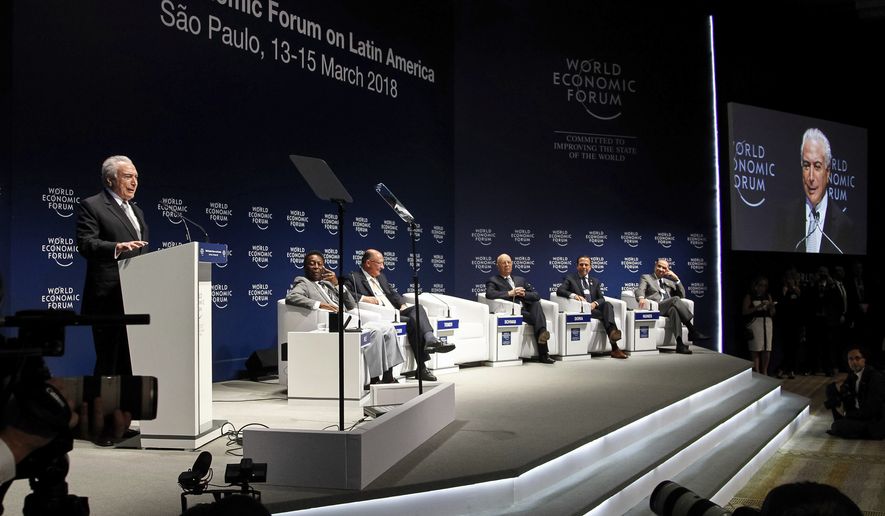OPINION:
Historians may mark President Trump’s tariffs on solar panels, aluminum and steel as the death knell for the World Trade Organization (WTO) but the institution was faltering long before President Trump came along.
After World War II, the GATT, which became the WTO, was created to foster freer trade among the Western allies and market reforms in emerging nations.
The membership grew to 164 nations and through eight rounds of multilateral negotiations — the last concluded in 1995 — tariffs were dramatically reduced and quotas on non-agricultural products virtually eliminated. Rules were expanded to include domestic policies like product standards, health regulations, government procurement, taxes and subsidies that may unfairly discriminate against imports or promote exports, and to intellectual property, licensing and other regulations affecting trade in services.
The United States reduced tariffs more than other countries and as the most market-oriented large economy, it has fewer administrative barriers to imports. The United States accepted more imports and worker adjustments to promote democracy and market reforms.
Over time, the WTO membership encompassed increasingly diverse nations. For example, Saudi Arabia joined in 2005, is not a democracy and hardly has a market economy — a monarchy and dependent on oil, its government seeks to rig petroleum markets through OPEC.
Non-democratic, non-market economies were admitted on the premise that participation in the system would encourage reforms, but as Saudi Arabia demonstrates — similar to Mexico in the 1980s — political and economic progress mostly happens when autocratic regimes are threatened by financial crisis. For the oil kingdom, it took the U.S. shale boom and prospects of oil permanently depressed at about $65 a barrel to inspire the House of Saud to select a progressive crown prince.
China joined the WTO in 2002 but has hardly liberalized. Beijing is perfecting Orwellian mechanisms to monitor its citizens’ activities and squash political dissent. President Xi is enhancing the role of state-owned enterprises, extending state influence over private firms and foreign subsidiaries, and compelling the latter to form joint ventures with Chinese firms and embrace Beijing’s propaganda strategies.
China’s state capitalism clearly creates unfair advantages, imposes trade deficits and job losses on other nations and has been the target of many unfair trade complaints in the WTO, but Beijing has invested in top flight U.S. lawyers — for example, Steptoe and Johnson. And the activities of its complex mix of state-owned and state-supported private enterprise have proven difficult to discipline under WTO rules, which were written to constrain governments operating in a market context.
From 2011 to 2017, the United States was frustrated in many dispute settlement processes covering nearly 50 industries. In 2016, the administration aides cited a long list of complaints in an effort to block the reappointment of a South Korean judge to the appellate body.
Since then, Mr. Trump has been vilified — as he seems to be for every principled action — for continuing this policy by blocking the appointment of other judges to compel reform.
During the early Obama years, Treasury Secretary Timothy Geithner sought European cooperation in addressing Chinese and other governments’ currency manipulation, but the Europeans, led by the German finance minister, told him to pound salt. He speciously cited the role of U.S. banks in the financial crisis as reason not to permit the Americans to dictate on currency matters.
That is understandable, because any WTO attention to currency has the potential to lay bare how Germany uses the single currency — in concert with its efforts to block pan-European fiscal and banking policies — to maintain a euro undervalued for the German economy and permanent trade surpluses.
The steel and aluminum tariffs offer Europeans the opportunity to obtain exceptions, for example, by embracing similar measures on Chinese exports — including those transshipped through third countries — or they can retaliate against the United States or bring a WTO complaint.
Mr. Trump had good reason to threaten to quit the WTO — it has proven ineffective for addressing American’s biggest trade problems — the $337 billion bilateral trade deficit with the Middle Kingdom, and China’s piracy of intellectual property and targeting of industries like artificial intelligence.
As with the U.K. and Brexit, Europeans, and Germans in particular, can chose to punish Americans by strict reliance on the rules of a failing institution or finally offer to help address the real menace to Western capitalism — China.
• Peter Morici is an economist and business professor at the University of Maryland, and a national columnist.




Please read our comment policy before commenting.